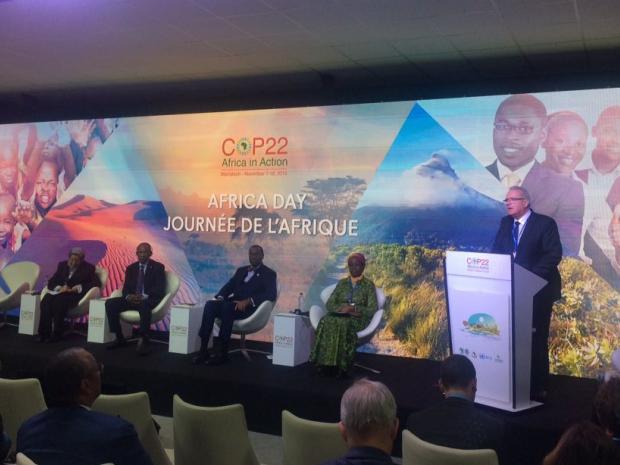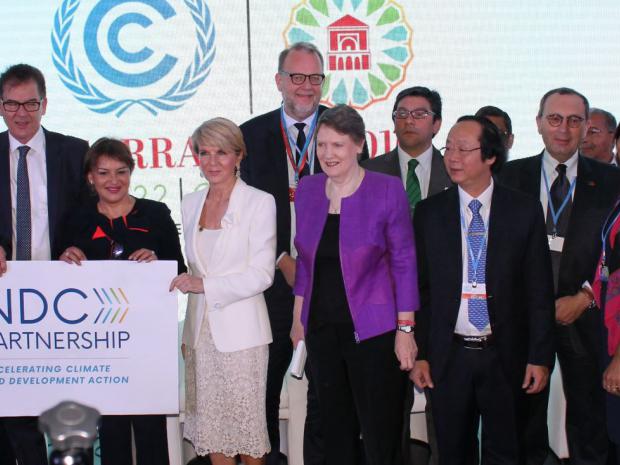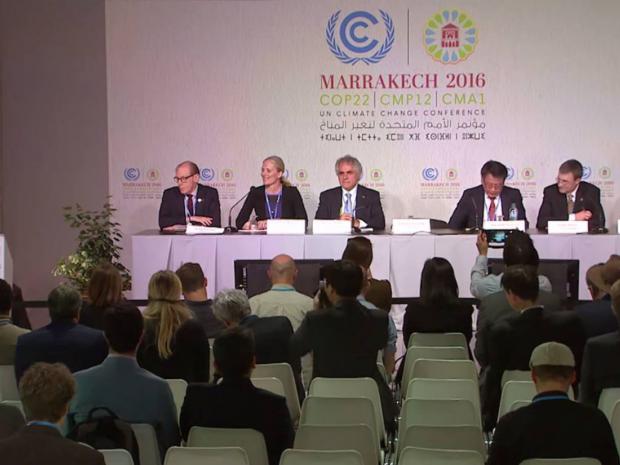Marrakech COP22: moving ahead on climate action
Discussion details
The annual United Nations climate conference in Marrakech, Morocco, started just 3 days after the Paris Agreement on climate change entered into force. The 22nd Conference of the Parties (COP22) to the United Nations Framework Convention on Climate Change (UNFCCC), the 12th session of the Conference of the Parties serving as the Meeting of the Parties to the Kyoto Protocol, and the first meeting of the Parties to the Paris Agreement (CMA 1) took place over two weeks and brought together ministers and government officials, as well as representatives from civil society and the business sector.
That the Paris Agreement entered into force less than a year after it was adopted shows the strength of the global commitment to fight climate change. The European Union played a decisive role in brokering the Paris Agreement and again showed its leadership in Marrakech; both in the negotiation of common international rules required to implement the Paris objectives, and in the demonstration of early actions to mitigate and adapt to climate change.
The EU is making quick progress in delivering on its own commitments to reduce harmful emissions by at least 40% by 2030. It has already brought forward policies to deliver on its pledges, which were presented at COP22 on 16 November. The EU is now working to integrate the Agenda 2030, the Addis Ababa Agenda for Action (AAAA), the Sendai Framework on Disaster Risk Reduction (DRR) and the Paris Agreement in the EU policy framework to meet its international commitments and reshape EU international development cooperation. In order to ensure development efforts are "climate-smart and sustainable", the EU is working to integrate climate change in all relevant sectors. All EU development and cooperation project proposals in the sectors identified are thus screened by a dedicated Environment and Climate Change Mainstreaming Facility (ECCM).
The Marrakech Conference has already delivered tangible progress on developing the detailed rulebook to implement the Paris Agreement, but further discussions will take place over the coming years. In parallel to the negotiations, COP22 has succeeded in enhancing action and transparency before 2020. Countries are putting in place ambitious climate policies and getting ready to implement their nationally determined contributions (NDCs) under the Paris Agreement.

Climate change and sustainable development are inextricably linked: achieving the 2030 Agenda for Sustainable Development and avoiding dangerous climate change through the Paris Agreement are two sides of the same coin. On both fronts the EU is active and ready to take its share of the global efforts to support climate action through its development cooperation with partner countries.
The EU and its Member States are already the biggest contributors of climate finance to developing countries, providing EUR 17.6 billion in 2015. At least 20% of the EU budget will be spent on climate action by 2020. This means that an estimated EUR 14 billion of public grants will support climate activities in developing countries between 2014 and 2020. This is a major contribution to the USD 100 billion goal, which developed countries agreed in 2009 to mobilise to help developing countries cope with the effects of climate change and to adopt a low-carbon development path.
Engaging non-government stakeholders across all relevant sectors is crucial. The new Global Climate Action initiative, agreed in Marrakech, builds on the Lima-Paris Action Agenda, like the Covenant of Mayors in Sub-Saharan Africa, and should catalyse ever more involvement.
EU showcasing its action at COP22
During the COP22, the EU Pavilion hosted more than 100 side events organised by Member States, local and regional authorities, businesses and civil society organisations from Europe and beyond:
- The Global Climate Change Alliance (GCCA+) hosted a side event on "Accessing and mobilising climate change finance for adaptation". It was a big success. Participants discussed new practices, processes and partnerships being tested as part of efforts to advance the mobilisation of resources for climate adaptation.
- The side event on the Covenant of Mayors in Sub-Saharan Africa brought together African mayors as inspiring examples to lead the way for local governments in addressing the triple challenge of energy access, mitigation and adaptation. Cities selected in the recent Call for Proposals in support of the Covenant of Mayors in Sub-Saharan Africa presented their proposed actions to implement climate and energy objectives on their territory. The event marks an important step in the endeavour to develop a network of city-to-city cooperation.

EU Commissioner Mimica and Director-General Manservisi at the Covenant of Mayors of Sub-Saharan Africa side-event.
- A side event on climate change, energy and gender contributed to the analysis of the opportunities and challenges related to gender, women’s entrepreneurship, the environment and adaptation to climate change while highlighting innovative initiatives involving women in the adaptation and mitigation of climate change. Gender equality is one of the core values of the European Union, and is enshrined in its legal and political framework.
- The EU Commission presented its new regional climate change cooperation programme for Latin America, EUROCLIMA+. Under EUROCLIMA+ the EU will provide support to Latin American countries in their efforts to adapt to and to mitigate climate change. It will focus on providing support to governments to implement the Paris Agreement.
- The EU participated in the high-level event on the Africa Renewable Energy Initiative (AREI) organised by the African Union. AREI is an Africa-owned and Africa-led inclusive effort to accelerate and scale up the harnessing of the continent’s huge renewable energy potential launched at COP21. Donors committed to mobilise at least USD 10 billion cumulatively from 2015 to 2020. The EU will contribute significantly to increasing renewable energy generation in Africa up to 2020 though the existing financial allocation and current financing instruments and procedures.
- The EU signed in a separate event two Joint Declarations on reinforced cooperation in the field of sustainable energy, with Zambia and Mozambique and a number of other EU MS and development partners, to strengthen alliances and demonstrate the joint commitment of all partners to support Zambia and Mozambique to provide their citizens with access to sustainable energy services.

EU Commissioner Mimica and Director-General Manservisi at the Covenant of Mayors of Sub-Saharan Africa side-event
- European Union Energy Day, organised by the European Commission’s Directorate-General for Energy, presented joint solutions for a sustainable planet. Throughout the day, Europe shared its achievements and the way forward on clean and smart energy in the 2030 perspective. Alongside experts from all over the world, the event was an opportunity to exchange practices to strengthen cooperation on sustainable, secure and smart energy that is affordable for all. Felice Zaccheo participated in two panels: the Energy in Rural Areas panel where the impact of the energy transition on economic development was discussed, with a special focus on Africa, and the Energy for Cities panel, which discussed the role of cities as drivers of growth and how they can lead the clean energy transition through an increased use of energy efficiency and renewable energy. Case studies presented at this session showed the importance of local actions to reach global climate goals.

Felice Zaccheo, Head of Unit, DG DEVCO (C6), EU Energy Day
- The EU joined the National Adaptation Plan (NAP) Global Network, together with Australia, Austria, Canada and France. The Network was created in 2014 to enhance support for national adaptation planning through peer learning and exchange, improved coordination, and supporting national level action on NAP development and implementation.
- Director-General Manservisi participated in a side-event at the African Union (AU) Pavilion on ‘Resilient Landscapes in Africa’s Drylands: Seizing Opportunities and Deepening Commitments’, organised with the AU and partners. At the event, the EU reiterated its support to strengthen commitment in Africa and among development partners to enhance investments in sustainable land management in order to strengthen resilience and food security, and address climate change. A leaflet on 'EU global action on sustainable land management' was distributed at the event.
- The EU also joined the NDC Partnership* during its High Level launch. This is a new global partnership led by Germany and the World Resources Institute dedicated to helping deliver the Paris Agreement on climate change and the SDGs. (*NDC = Nationally Determined Contribution).

Director-General Manservisi. NDC Partnership high-level launch event.
- DG DEVCO participated in the side event "Nationally Determined Contributions and Agriculture: the challenge of effective international support", organised by the French Ministry of Foreign Affairs and International Development.
- Director-General Manservisi represented the European Commission in a side event organised jointly with the German and UK development ministries called ‘InsuResilience delivers! – Joint Action on Climate Risk Insurance’. This included the endorsement of the new Joint Statement on InsuResilience, which reaffirms the June 2015 G7 climate risk insurance commitments and the Joint Statement on InsuResilience endorsed at the COP 21 in Paris in December 2015, and presents the updated rapid action package allowing the initiative to move quickly towards the goal of insuring 400 million people by 2020 in the most vulnerable developing countries.
- Canada, Denmark, Germany, Italy, Japan, Korea, Switzerland, the US and the European Commission announced more than USD 23 million to scale-up support for technology to help countries achieve their commitments under the Paris Agreement. This will be provided through the UNFCCC's Climate Technology Centre & Network (CTCN). The EU is the largest donor to the CTCN, with funding from the European Commission and EU Member States Ireland, Finland and Sweden. The Commission provides EUR 12m to the CTCN to deliver tailored capacity building and technical assistance at the request of developing countries across a broad range of mitigation and adaptation technology and policy sectors. As countries around the world seek to meet their mitigation and adaptation goals, the CTCN has harnessed expertise from an expanding global network of over 230 technology institutions, from finance, NGO, private, and research sectors, to provide expert policy and technology support to developing country stakeholders, coordinated by nationally-selected focal points in over 150 countries.

DG DEVCO Director Ridolfi. CTCN side-event;

Log in with your EU Login account to post or comment on the platform.